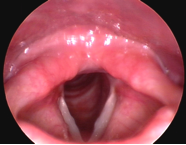So I’m sure you remember this photo from the last post…
Today was my first voice therapy session with Ms. Kitchie Molina at St. Luke’s Medical Center–Global City. As promised, here’s the update about it.
To be honest, I had two different ideas of how this was all going to go. The first was going to be this super-anatomical, white-lab-coat, instruments and microphones shoved down my gullet approach where I would be examined and diagnosed much like how you’d be in a routine medical checkup. The other scenario was the gentle, touchy-feely, lie-on-the-couch, how-are-you-feeling sort of approach that is usually associated with the word “therapy”–stress and psychological well-being do play huge factors in vocal wellbeing, after all.
What I ended up having with Ms. Kitchie, however, wasn’t even remotely close to either. In fact, it bore more resemblance to a standard voice lesson/conservatory approach, like what I’d had before with (the person I consider my best teacher ever; probably wouldn’t even be in this mess if I’d kept seeing her) Jai Sabas-Arracama. Ms. Kitchie even knew Tita Jai, or at least knew of her, which was unsurprising given that they are both from the University of The Philippines School of Music. And, like Tita Jai, Ms. Kitchie had a rather infectious aura of joie de vivre, which I guess comes from making a career out of beautiful music. I kind of figured I was going to like her on sight.
As in a standard voice lesson, I was ushered into a little (and I mean little; it was probably the size of my mum’s closet) room with a piano and a mirror on one wall. Unlike a standard voice lesson, however, Ms. Kitchie didn’t immediately start me on vocalization. After glancing through my file (remember this post?), she asked me a couple of questions about my range, where I’d been singing, any changes in vocal behavior prior to the nodes, and other sort of standard voice/medicine stuff, then promptly launched into a short lecture on the physiology of the voice–something that, as an information junkie, I greatly appreciated.
Ms. Kitchie explained that the approach she would be taking with me was more physiological or, as she put it, “biomechanical” (sounds cool, doesn’t it). She outlined five areas of “machinery” that affected vocal performance: the motivator (your brain), the generator (your lungs, diaphragm, abs, and the muscles between your ribs whose name escapes me at the moment), the phonator (vocal cords), the resonators (the cavities in your head and chest that make your voice uniquely yours), and the articulators (teeth, tongue, hard and soft palate, lips). Then she explained how different problems in the use of each of the five areas could affect vocal performance, like using the wrong speaking pitch (speaking like an alto when actually a soprano, and vise versa).
I sort of brushed that issue off when she mentioned it, saying (in not so many words; I was more content to nod and soak in all the info) that I was definitely a confirmed alto and spoke like one.
After she’d explained some more about the physiology of the method she’d be using on me today–complete with a bit of a history lesson–we finally started the therapy proper. Explaining that the vocal cords were actually connected to all my facial muscles and the muscles in my neck and chest, she taught me a series of massages and stretching techniques to relax my face, Adam’s apple (girls have them too, apparently; it just doesn’t stick out), tongue, neck, and jaw. I found out that I had incredibly tense muscles everywhere, which is probably due to being a Dragon U student and not having very much time to breathe, let alone relax, but Ms. Kitchie assured me that with practice and regular use of the techniques my body would eventually adapt to its new normal.
Also, that “inner smile” technique I’d been using in my chorale singing days? Totally wrong. Apparently that just makes vocal tension worse, as does dropping (and locking) the jaw.
Once all that was done, she started working out what was wrong with my breathing. Which, apparently, was everything. This didn’t surprise me: I’d always had trouble grasping the concept of using the diaphragm in singing, although I had a vague idea it had to do with something contracting under my lungs. Turns out, I could pretty much let the diaphragm take care of itself–the real important player was the abdomen. Specifically, how it expands and contracts when I breathe. When you’re breathing properly in singing, your upper torso shouldn’t actually move. Instead, your belly shoots out when you draw in air, and then slowly pulls in as you exhale. Ms. Kitchie had me simulate “singing” by having me exhale in a steady stream then suddenly inhale, hands on my belly (I felt like a pregnant woman, guh) the whole time to feel it pulling in and shooting out. She also fixed my posture, particularly the placement of my head and neck.
It was a whole lot to process, and I’m not sure I remember half of it (well, the breathing bit I’ve sort of forced myself to remember, for reasons I’ll mention later), which is why it’s definitely a good thing that I’ll be seeing her again next week.
Finally, after the massaging and the stretching and the breathing, we actually started singing. Vocalizing, to be specific, but after being silent for nearly two weeks being able to produce any sort of musical sound with my voice made me so happy I nearly got emotional. (Ms. Kitchie had to keep reminding me not to close my eyes and to watch myself in the mirror.) She gave me the usual series of loo-loo-loos and mi-re-la-etcetera fare that Tita Jai would have me work on, but I found it odd that she kept pushing me into my upper register instead of spending more time on me going low, as most voice teachers (excepting Tita Jai, who liked to shuffle pitches around in what was akin to vocal aerobics) usually had me do. I figured she was trying to see the extent of the nodes situation, as it usually affects the higher pitches more, so I went along with it, watching my breathing and trying not to wince when my high notes came out breathy and hoarse.
In the middle of a particularly varied phrase (where the notes go up then down instead of just gradually going up or going down), she stopped me suddenly with, “I don’t see you grimacing here. You’re not an alto.”
That floored me. “What?“
“This key,” she tapped a relatively high noted on the piano, “would usually have altos tensing up and grimacing, even if they’re singing right. When you sing right, you don’t even wince here. You’re not an alto.”
Take note that since I started chorale singing at seven years old, I had always believed I was an alto. An alto with a very wide upper register, to be sure, but an alto nonetheless, with the capacity to boom out comfortable low notes. Apparently, though, I had been misled. Though habit had made me resonant in the lower ranges, my true “comfortable” range was closer to the high, soaring keys I’d often felt were impossible to me. Even my speaking voice was all wrong, causing me to “fry” my voice (when it gets all gravelly and gurgly in your throat) and irritating my vocal cords.
I’d had a clue that this was the case when, during the Miss Saigon audition season, Tita Jai had declared I was actually a mezzo-soprano (the story behind that here), but I’d always thought she’d meant that I’d managed to stretch myself so I could reach that range. What had actually happened was that my vocal cords had grown since I was seven–they in fact only stop growing at age twenty-one–and so over the years, I had been forced into an alto box when I was in fact slowly evolving into a soprano. A potential spinto soprano, in fact, though with the thick vocal quality of a mezzo. It was that thick vocal quality that lead people to believe I was an alto, but in truth my range was actually above it.
Years of singing and speaking in a lower pitch than natural had eventually taken their toll, leading to my pre-nodular swelling (apparently I don’t actually have full-blown nodes just yet). Acid reflux notwithstanding (that’s another factor, actually), it was the fact that I’d actually grown into a higher voice, quite without my knowledge, that was causing all the problems.
With therapy and practice, I’ll be able to make proper use of my newly-stretched vocal cords, which leads me to the big news…
Project Zipped Lips is, essentially, OVER.
I CAN SING AGAIN!
While total vocal rest was good for letting my vocal cords heal from the beating they’d taken for the past twenty years, in actuality they do very little to resolve my issue. In fact, I’m supposed to use my voice, but use it in the proper way. After Ms. Kitchie helped me figure out my new speaking pitch–nowhere near the low baritone that I apparently was merely faking all these years–I was given the directive to ditch the whiteboard and practice everything she taught me. Which I proceeded to do. With gusto. Who knew the hallways of St. Luke’s had such great acoustics?
Just happy I can sing again.
So my season of silence has, apparently, ended. While I won’t be leading worship for a while yet and my initial gusto at “practicing” has landed me with a bit of a sore throat (easy there, tiger), essentially I can once again resume communicating as a “normal” person, albeit with more attention to breathing and less intensity than before. And I think that’s a good thing, the new restrictions that are placed on how I can speak and sing. If anything, they’re freeing, because once I master them I won’t ever have to worry about losing the voice that, in the past two weeks of silence, I’ve learned to appreciate more and more. No more comparing myself to my friends or belittling my range–now, I’m just grateful to have what I have, weirdly-textured soprano and all.
So that’s it for now! I guess we’ll have to be renaming Project Zipped Lips as Project Breathe, but since I’m still determined to limit my vocal activity, I’ll continue updates on new developments. I’m definitely excited to see what elsecomes up in the next couple of weeks! If today is any indication, it’s all up from here!
~aRoamingTsinay~





Hi may i know how i can contact ms kitchie molina for voice lessons?
LikeLike
Hi C! I got her via St. Luke’s as I had voice therapy. But Ms. Kitchy is Google-able. 🙂
LikeLike
Hi! Thank you for this. I’d like to know how i can contact ms kitchie? And how much does she charge for sessions?
LikeLike
Hi Ann! I got her via St. Luke’s Medical Center in Fort Bonifacio. She’s also Google-able! 🙂
LikeLike
Hi! May i know how I can contact Ms Jai for vocal lessons? Thank you!!
LikeLike